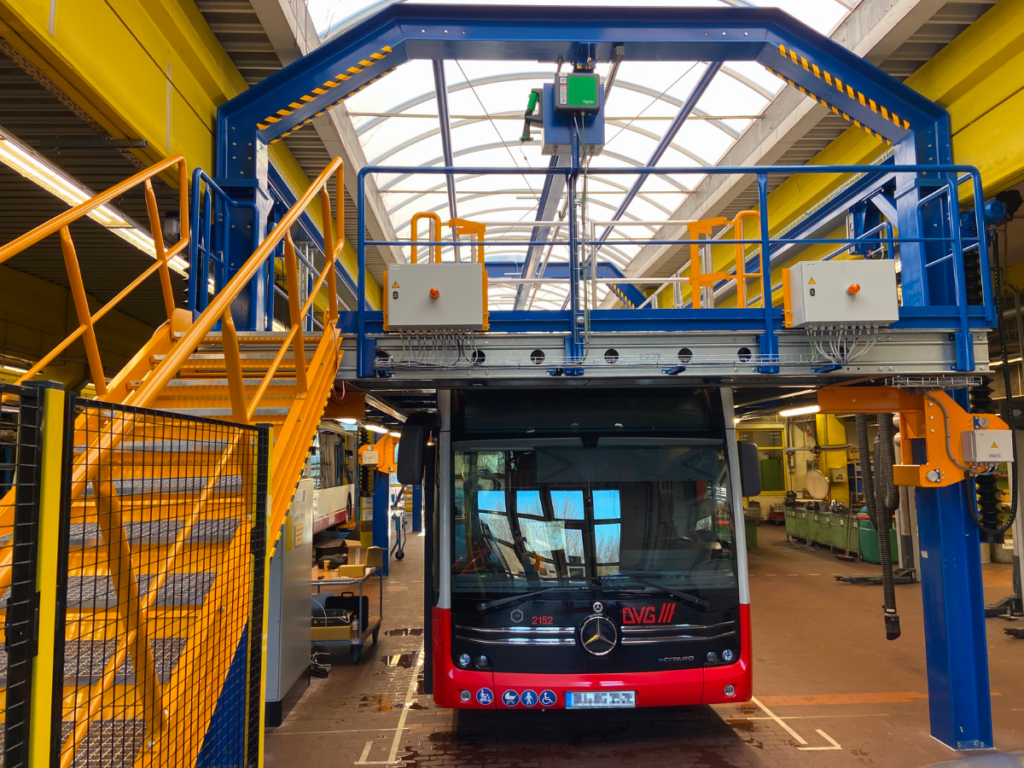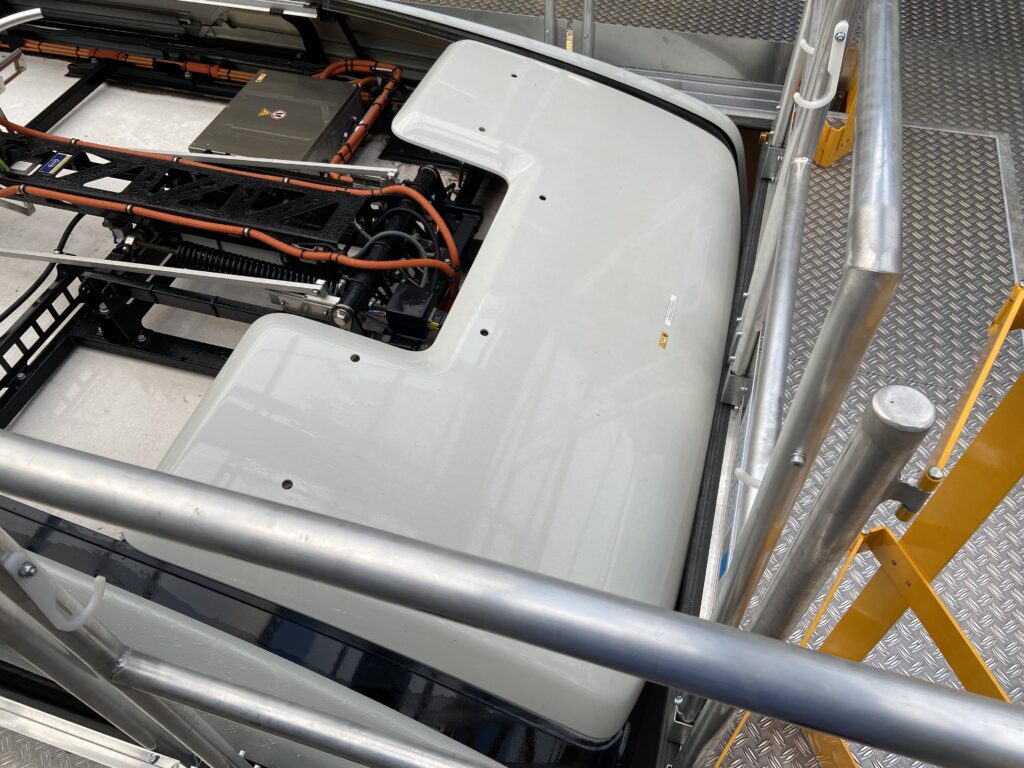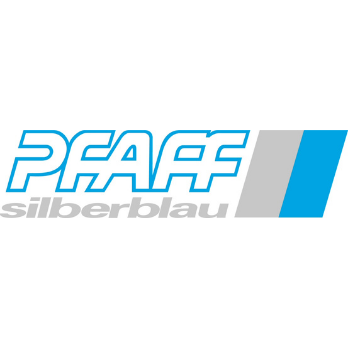Pfaff Verkehrstechnik Supplies Height-Adjustable Roof Working Platforms to DVG for the Maintenance and Repair of the Bus Fleet
Municipal transport companies, including Duisburger Verkehrsgesellschaft AG (DVG), a member of the Rhein-Ruhr transport association, are increasingly using the new height-adjustable roof working platforms from Pfaff Verkehrstechnik. The system recently installed in Duisburg with a total length of 20 m and integrated crane technology from STAHL CraneSystems is used to safely and efficiently carry out maintenance and repair work on the roofs and windows of DVG buses. Pfaff Verkehrstechnik has already delivered several such systems throughout Europe.

Flexible Concept for Ergonomic All-Round Safety Guards
Thanks to the flexible modular concept with adjustable heights and different segment lengths, the roof working platforms can be adapted quickly and flexibly to all buses in the fleet. The electromechanically extendable working platforms and sliding safety guards at the front and rear ensure ergonomic all-round fall protection, regardless of which fleet vehicle is in the work bay. The mechanics can safely reach their workplace on the roof of the vehicle via height-adjustable stairs. Optional components such as various crane systems, lighting equipment, signalling systems or monitored access doors increase efficiency and safety.
DVG has been operating local public transport in Duisburg for over 140 years. With over 100 buses and around 60 trams, the company transports over 50 million passengers a year, about 142,000 people a day. The bus network consists of 43 lines and is almost 450 kilometres long. In addition to diesel vehicles, the bus fleet also consists of electrically powered articulated buses, which are based at the depot “Am Unkelstein” near Duisburg’s inner harbour. The new height adjustable roof working platform from Pfaff Verkehrstechnik was installed as an extension to the existing equipment in the DVG motor bus workshop located there, where the operational maintenance of all buses takes place.
New Challenges Presented by Electric Mobility
Some of DVG’s buses are battery-powered. This kind of articulated electric bus has ten powerful high-voltage battery packs with a total capacity of 330 kWh, which ensure an appropriate range. DVG is also planning further investments, not least motivated by the Clean Road Vehicles Procurement Act (SaubFahrzeug-BeschG), which came into force on 02.08.2021 and makes the requirements of the EU “Clean Vehicle Directive” mandatory in German law.
DVG plans to convert the entire diesel bus fleet to hydrogen propulsion by 2030. For this purpose, 100 fuel cell buses and a suitably scalable workshop infrastructure are still to be procured. The system currently being implemented is a first step in this direction, because “clean” buses and electric buses pose new challenges for depots, workshops and employees.
In contrast to conventional buses, which run on diesel and require hardly any work on the roof, electric buses require more maintenance work on the roof, because heavy electrical and other high-maintenance components, such as battery packs, as well as fuse boxes, inverters and air conditioning systems, are located there for the sake of convenience. These components require regular maintenance. There are also additional hazards and challenges for the maintenance crew due to the rounded plastic roofs. The new roof working platforms from Pfaff Verkehrstechnik ensure maximum safety and ergonomics for all DVG bus variants.
Ergonomics Thanks to Flexible Height Adjustment and Cantilever Crane Technology
On the new working platform from Pfaff Verkehrstechnik, the walkways can be adjusted in height within a range of 2.5 m to 3.2 m, with the access steps flexibly adapting to the respective height. The platform modules add up to a total length of 20 m. An electric chain hoist that cantilevers by 2.850 m at the front is mounted above the modules. The modules can be loaded with 200 kg/m2. They have a base width of 800 mm and allow lateral extension of 500 mm to facilitate seamless approach to the roof. The mechanics can move freely and safely on the entire walking surface as well as over the front connecting bridge with front safety guards. Emergency escape ladders and protective fences to restrict access in the event of an unsafe operating condition further increase safety for the operating crew.
The entire system is supplied by Pfaff Verkehrstechnik as a turnkey solution. The electric chain hoist used comes from STAHL CraneSystems, a company which, like Pfaff Verkehrstechnik, also belongs to Columbus McKinnon (CMCO). This presents a major advantage: CMCO can tap synergy effects as a group of companies, which, in turn, enables its brands such as Pfaff Verkehrstechnik to offer engineering solutions from a single source. Using the ST 2010-12/3 1/1 electric chain hoist from the ST range, loads such as batteries or other heavy components weighing up to one tonne can be conveniently and ergonomically replaced on the roof of the vehicles.

The STAHL CraneSystems brand has come to stand for reliable and safe lifting equipment as well as crane components and engineering solutions. The ST chain hoist range from this manufacturer is regarded by users as powerful, reliable and undemanding in terms of maintenance and energy consumption. The ST modular system allows numerous combinations of the sub-assemblies for customised solutions and adjustment heights in the load capacity range from 125 kg to 6,300 kg.
Safety for Fleet Operators from Planning to Commissioning
Pfaff Verkehrstechnik’s service package ranges from the planning of the working platform to the commissioning and training of the personnel. Installation in new buildings and existing halls is preceded by comprehensive consultation and analysis of the current infrastructure. The company also offers a comprehensive after-sales service, including long-term maintenance contracts and a spare parts service.
With the solution from Pfaff Verkehrstechnik, municipal bus operators such as DVG can ensure safe working conditions even with mixed vehicle fleets. The flexibly adaptable roof working platforms set high safety standards, by minimising hazardous areas where people could fall and providing ergonomic access to the vehicle roof. They provide fleet operators with modern, safe and reliable mobility. Due to short set-up times, the vehicles are quickly ready for operation again, and their operating times in transport use are extended.
This article was originally published by Pfaff Verkehrstechnik GmbH.

